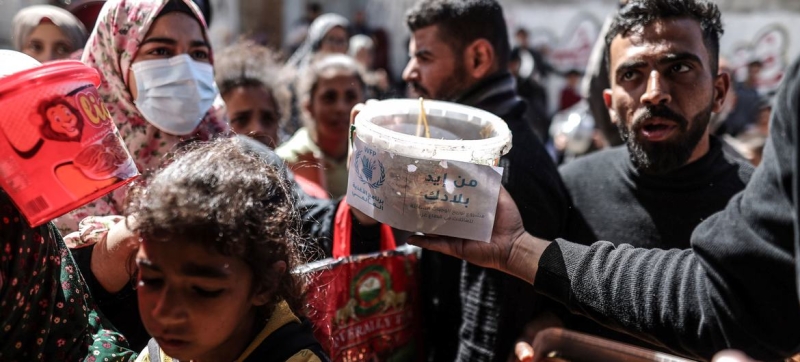
Distribution of food aid in Gaza. WHO chief asks for permission to increase aid supplies to Gaza Peace and security
“Children survived the bombing, but they will not survive hunger,” WHO head Tedros Adhanom Ghebreyesus said today. He urged permission to increase aid supplies to Gaza, especially to the north of the enclave, where one in six children are malnourished and at risk of dying from malnutrition.
This is not the first time that representatives of UN agencies have warned about the desperate situation of Gazan residents, including the youngest of them. The humanitarian supplies that can be transported into the sector today are not enough to provide people with the most basic necessities. Obstacles caused by the Israeli authorities, as well as military operations, do not allow increasing the volume of assistance.
Malnourished children
Tragic reports have emerged from northern Gaza in recent days that at least 10 children have died from starvation and dehydration. “A child should eat three times a day, one meal a day is not enough,” says Imad Dardona, a doctor at a hospital in Gaza. According to him, doctors cannot help half of the children admitted to the clinic because there are not enough funds. “The most we can do for them is give them a saline solution or a sugar solution,” Dardona added.
Calls for a ceasefire
The UN Security Council continues to try to pass a resolution that could make a real difference for the residents Gases. The draft document proposed by the United States is now on the agenda. It calls for “an immediate ceasefire in Gaza for approximately six weeks, along with the release of all hostages.” Negotiations for a ceasefire related to the release of all remaining hostages continue throughout the day.
Shipping in the Red Sea
The day before, UN High Commissioner for Human Rights Volker Türk warned that the conflict in Gaza could engulf all countries of the Middle East and spill out beyond the region. The UN, in particular, is extremely concerned about the situation in the Red Sea, where Yemen’s Houthi militants continue to attack international ships, saying that in this way they show solidarity with the residents of Gaza. Meanwhile, these attacks lead to a drop in transport volumes and pose a threat to international trade.
Interruptions on main routes
“Given the risk of attacks in the Red Sea, many ships are now avoiding the canal, taking the longer route around Africa,” the United Nations Conference on Trade and Development (UNCTAD) said in its latest report. “In the first half of February 2024, 586 container ships were diverted, and container tonnage crossing the canal fell by 82 percent.”
Last year, this key shipping route accounted for about 22 percent of the world’s container shipping, including natural gas, oil, automobiles, raw materials and many industrial goods.
Read also:
Sea transportation food: how FAO is helping to cope with threats
At the same time, as we have already written, the crisis in the Red Sea has only exacerbated problems for the industry related to the impact of Russia’s invasion of Ukraine on shipping in the Black Sea, as well as a reduction in transit through the Panama Canal.
Increasing emissions
This is the first time that the world faced disruptions simultaneously on two major trade routes. UNCTAD warns that this will have a negative impact on inflation, as well as food and energy security. “Developing countries will be particularly vulnerable,” said report author Jan Hoffman.
There is another aspect to this problem – rising carbon emissions. Vessels forced to avoid problem areas increase their speed to make up for lost time. At the same time, they burn more fuel and harm the environment. According to UNCTAD, average delivery speeds have increased by about six percent since December, meaning the devastating carbon footprint has increased accordingly.
